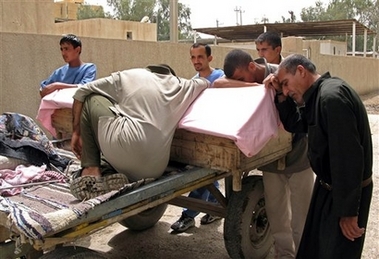Middle East
Iraqi leader warns Iran of terror threat
(AP)
Updated: 2007-04-30 15:36
 |
Large Medium Small |
BAGHDAD - Iran agreed Sunday to join the US and other countries at a conference on Iraq this week, raising hopes the government in Tehran would help stabilize its violent neighbor and stem the flow of guns and bombs over the border.
 Iraqis mourn over the coffin of their relative collected from a local morgue in Baqouba, 60 kilometers (35 miles) northeast of Baghdad, Iraq, Sunday, April 29, 2007. [AP]  |
Al-Maliki's national security adviser, Mowaffak al-Rubaie, said Sunday that the US has not provided Iraq with any "solid evidence" that Iran is arming fighters in Iraq.
Meanwhile, the US military said Monday that four US soldiers and an Iraqi interpreter were killed in separate attacks in the capital, including three in a single roadside bombing, making April the deadliest month so far this year.
Secretary of State Condoleezza Rice is also expected to attend the Iraq conference in the Egyptian resort of Sharm El-Sheik on Thursday and Friday, raising the possibility of a rare direct encounter between high-level US and Iranian officials.
In Washington, Rice would not rule out a meeting with the Iranians, whose delegation will be led by Foreign Minister Manouchehr Mottaki.
"But what do we need to do? It's quite obvious. Stop the flow of arms to foreign fighters. Stop the flow of foreign fighters across the borders," Rice told ABC's "This Week."
Earlier this month, US military spokesman Maj. Gen. William Caldwell said Iranian intelligence operatives have been training Iraqi fighters inside Iran on how to use and assemble deadly roadside bombs known as EFPs, or explosively formed penetrators.
He said Iranian support extended to Sunnis as well as Shiites in Iraq, showing reporters photographs of what he said were Iranian-made mortar rounds, RPG rounds and rockets that were found recently in a Sunni neighborhood of Baghdad.
But al-Rubaie said the US has not shared any proof with the Iraqi government that Iran is arming insurgents in the country.
"I'm saying this categorically: There is no solid evidence that Iran is supporting or helping al-Qaida in any way," he said in Tampa, Fla. where he is attending a three-day meeting with other international defense leaders at US Central Command headquarters.
Iraqi leaders had been pressing for the Iranians to attend the meeting in Sharm el-Sheik for weeks, but Iran refused to commit, in part because of fears that it would come under pressure from the US and others about its nuclear program.
In addition, the Iranians have been lobbying for release of five Iranians held by the US in Iraq since January. The US has accused the five of links to an Iranian Revolutionary Guard unit that arms and trains Shiite extremists in Iraq and elsewhere in the Middle East.
The decision to attend "came after consultations between Iraqi officials and the Iranian president," Foreign Ministry spokesman Mohammad Ali Hosseini said in an interview with Iranian state television.
Senior Iranian envoy Ali Larijani flew to Baghdad on Sunday for talks with al-Maliki and other senior Iraqi officials - the highest-ranking Iranian official to visit Iraq since the collapse of Saddam Hussein's administration in 2003.
During their meeting, Larijani told al-Maliki that all countries that want stability in the region "have no choice but to support Iraq's elected government."
Al-Maliki replied that terrorist attacks in Iraq would hurt all countries in the region, "including those that are supposed to support the Iraqi government," according to a statement by the prime minister's office. Although al-Maliki did not refer to specific terror groups, it appeared that his remarks were not limited to Sunni insurgents but included Shiite extremists, as well.
In Tehran, the head of the Iranian parliamentary committee on national security and foreign policy, Alaeddin Boroojerdi, also said Iran's failure to participate in Sharm el-Sheik would lay the Islamic republic open to criticism from the United States.
| 分享按鈕 |